Provider & Staff Education: Level 1
Evaluate and provide baseline education
Build knowledge among providers and staff by identifying educational requirements, assessing their existing level of knowledge, and developing an education plan to fill gaps. Once the plan is implemented, conduct ongoing evaluations and make adjustments as needed.
Program efficacy begins with provider and staff knowledge. Establishing and maintaining a baseline level of knowledge is particularly important for adult immunizations, as there are many components to ensuring vaccine safety and the guidelines are updated frequently. To develop, implement, and maintain an effective staff education program, follow the steps below.
Step 1:
Determine baseline knowledge required for team members working on routine adult immunizations
Refer to the Getting Started Checklist for information regarding establishing your Rise to Immunize® (RIZE) team. Education requirements will vary based on role. Be sure to clarify responsibilities and expectations among your team. Important baseline education may include:
- Importance of immunizations
- Storage and handling requirements
- Vaccine schedules
- Protocols for vaccine preparation and administration
- Contraindications
- Monitoring for and reporting adverse events
- Documentation and records procedures
Step 2:
Assess existing knowledge and skills
Once you’ve established education and skills requirements by role, assess your team’s baseline knowledge (e.g., conduct a baseline survey) and identify areas for improvement. Annual competency evaluations are recommended for direct patient care staff who administer vaccinations.
Step 3:
Develop and implement an education plan
Develop a plan to provide education that addresses knowledge and skills gaps. Your team’s Immunization Champion is an ideal person to develop and implement educational activities. Consider leveraging existing provider and staff touchpoints such as:
- Daily huddles
- Provider/staff meetings
- New hire orientations and training
- Internal newsletters
- Employee communications such as intranet content and facility signage
- Physical materials at workstations (e.g., pocket-guides, laminated handouts, etc.)
- On-the-job activities such as mentoring and shadowing
Step 4:
Keep evaluating, adjusting, and improving
It is important to stay up to date on vaccine education and skills, particularly since immunization guidelines are updated frequently. Offer opportunities to reevaluate and refresh knowledge and skills annually and after important updates to the Centers for Disease Control and Prevention’s Immunization Schedules. The RIZE quarterly data reports may also offer an opportunity to educate in relation to campaign performance and areas for improvement.
Immunization Update Training
Intermountain Healthcare
Provides an example of a staff training on immunizations conducted in advance of the 2017-2018 influenza season. Includes “pop quiz” questions for staff with answers; recent study results; available influenza vaccines by manufacturer; and tools and best practices to assist vaccine providers.
View Tool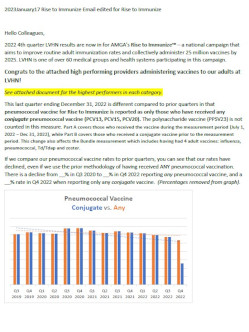
Rise to Immunize® Internal Data Communication Email
Lehigh Valley Physician Group
Presents an example of a medical group’s internal email communication following the release of a RIZE quarterly blinded comparative data report to encourage providers and staff to learn from the benchmarking report and drive improvement.
View Tool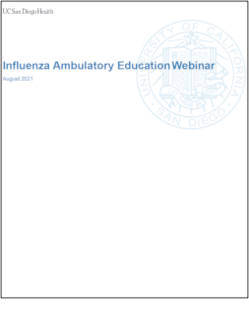
Influenza Ambulatory Education Webinar
UC San Diego Health
Offers a seasonal training on influenza vaccination recommendations, current offerings, and clinic responsibilities.
View Tool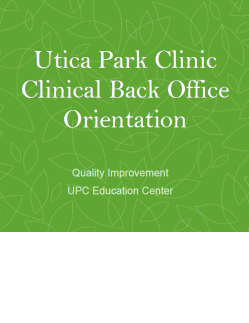
Clinical Back Office Orientation
Utica Park Clinic
Presents orientation information for clinical back-office staff. Slides 44 - 74 identify evidence-based guidelines and best practices for medication and safe injection practices as well as vaccine storage and handling.
View Tool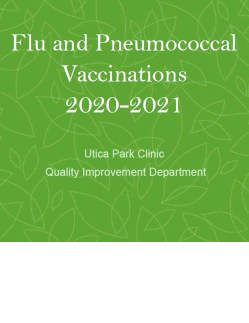
Flu and Pneumococcal Vaccinations Training
Utica Park Clinic
Provides education to staff in advance of 2020-2021 flu season, including: available influenza vaccines and recommendations, pneumonia vaccination schedules, safe injection practices, documentation, and safe vaccine storage and handling practices.
View Tool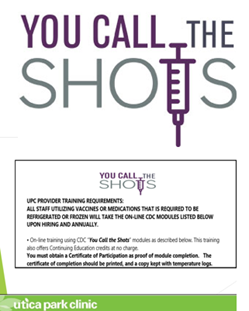
"You Call the Shots" Training
Utica Park Clinic
Outlines how a healthcare organization utilizes the Center for Disease Control and Prevention’s (CDC’s) "You Call the Shots" Training—an interactive, web-based immunization training course. The presentation describes how to access training, the learning objectives of different modules, and which modules are required for which staff.
View Tool
Hepatitis B Vaccination Information for Adults
Hepatitis B Foundation
Provides information for providers regarding the hepatitis B vaccine, including screening information, HBV risk factors, billing and insurance information, and a vaccine schedule.
View Tool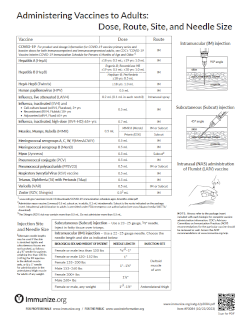
"Administering Vaccines to Adults: Dose, Route, Site, and Needle Size" Factsheet
Immunize.org
Describes the appropriate dose, route, site, and needle size to use when administering adult vaccines. This factsheet also provides diagrams for intramuscular and subcutaneous injections as well as intranasal administration.
View Tool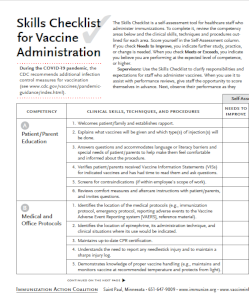
Skills Checklist for Vaccine Administration
Immunize.org
Provides a self-assessment tool for healthcare staff who administer immunizations, enabling them to identify which clinical skills, techniques, and procedures need improvement and those that meet or exceed expected level of competence.
View Tool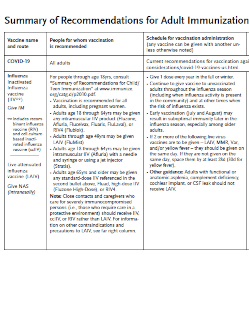
Summary of Recommendations for Adult Immunization
Immunize.org
Offers a summary of recommendations for adult immunizations, including vaccine name and route, people for whom the vaccine is recommended, schedule for vaccine administration, and contraindications and precautions.
View Tool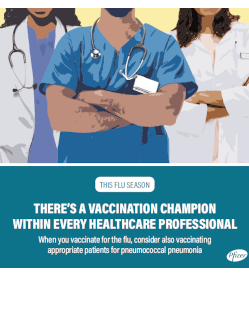
Vaccination Champions Leave Behind
SPONSOR: Pfizer
Prompts healthcare providers to initiate discussions during flu season about pneumococcal pneumonia with patients who are 65 years of age or older, and those 19 years of age or older with certain underlying medical conditions, who are at increased risk.
View Tool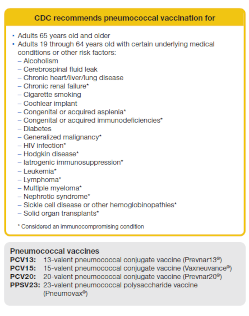
Pneumococcal Vaccine Timing for Adults
Centers for Disease Control and Prevention (CDC)
Outlines recommended pneumococcal vaccine timing for adults. This resource includes recommendations based on underlying medical conditions and risk factors, age group, and status of previous pneumococcal vaccine(s) administered.
View Tool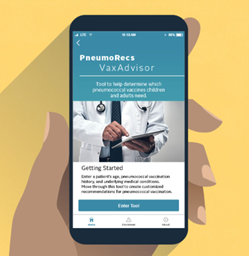
PneumoRecs VaxAdvisor Mobile App
Centers for Disease Control and Prevention (CDC)
Informs vaccine providers of pneumococcal vaccination guidance. The app is designed for healthcare professionals to quickly and easily determine which pneumococcal vaccine(s) a patient needs and when.
View ToolCampaign Planks
Provider & Staff Education
Clinical Support
IT / Documentation
Patient Education
